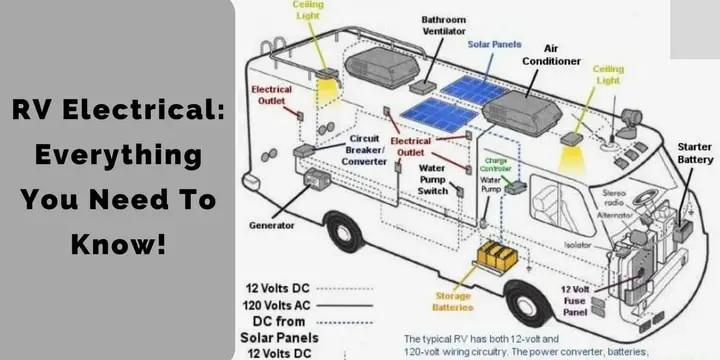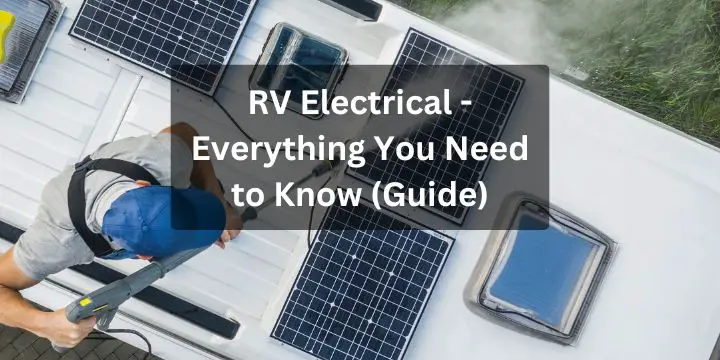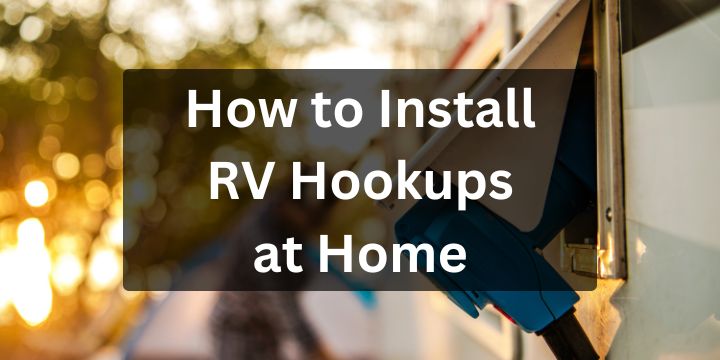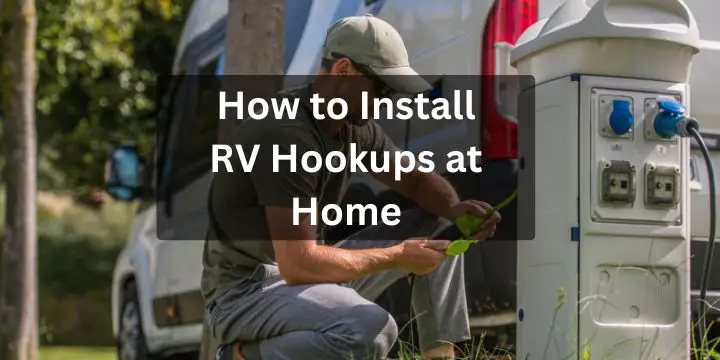RV Electrical: Everything You Need To Know!
Your RV is downright your den when you happen to be far away from home. This sheds a candid interpretation of the required knowledge to operate all the multifarious yet dangerous electrical devices. The ground basics of all the central roles of the panels, wires, batteries, and cables are vital knowledge to digest.
The unlimited power supply does not check-in RVs, so it is simply bad news to implement overload by utilizing vast electrical devices. For the smooth run, never exceed the available wattage. This formula will keep you covered whilst protecting your system circuit from toast – watts=amps x volts.
Outlined below consists of all that matters about these aspects;
One RV – 2 Electrical Systems
RVs have two core electrical systems. They include; 120 volts and 12 volts electric systems. Multiple batteries or just a single battery are utilized by the 12-volt system. Its role includes supplementation of energy to your refrigerator, furnace, water heater, carbon monoxide detector, water pump, a quite large number of your RV lighting system, and many more relating factors.
The 120 volts is powered by a generator or an RV electric hook-up plug and it bears with it the role of running mostly used items like the TV, kitchen appliances, and more of daily use items.
Low Down on Batteries
The 12-volt system must have 12 volts which are attained by either multiple or single 12-volt batteries meshed jointly in a parallel circuit. Nevertheless, implementing two 6 volt batteries jointly interconnected delivers optimum results than the single 12-volt battery.
We owe this for the durability effect of the battery life or in other similar terms the ‘deeper discharge time’. Two batteries occupying more space than one is the catch when employing the 6 volts batteries. Mostly suitable for a longer stay as it preserves batteries accordingly.
You can automatically re-power your 12-volt batteries(battery) as long as you are plugged into a power source. In the case of dry camping where you are not plugged in, you can still utilize your batteries to feed an electric appliance that runs under 12 volts.
Also, including an inverter rocket the 12 volts direct current to 120 volts hence you can power appliances that run on alternate 120 volts whilst exercising your RVs electrical outlet. Keep track of the discharge time for the recharge.
Video Overview: RV Batteries What You Need To Know.
Relate Post: 5 Best RV Battery Reviews.
50 amp or 30 amp
RV’s power cords descend down with two amperage’s, 50 amp and 30 amp.
30 amp cord possess three prongs which differ from the 50 which is four. 50 amp hook up has rattling benefits as one can exhaust more electricity at a single time compared to 30 amp.
RVs that only have 30 amp hookups as their sole option might need to invest $20 for a slight decrease of 50 amp to 30 amp adapter. This is due to the fact that most campgrounds have only 30 amp hookups in place.
Though you will use a lesser amount of electricity as compared to the 50 amperage plugin. Keep in my mind that a 30 amp capacity can’t be adapted to exercise a 50 amp cord.
Shorter extension cords and adapters are also well-appointed to combat voltage drops. Consider this take for a smooth run.
Video Overview: 30 Amp RV vs 50 Amp RV
Before plugging in the RV’s electrical hookup
Safety is a blistering situation to have adhered at all times. Never turn on right away all-electric appliances once plugged into a campground.
It’s always judicious to test your hook up with a polarity tester for assurance of the good condition of the campground’s wiring. Your polarity tester will guarantee if it’s safe to use before roasting up your RV electrical systems.
Switch everything off (your RV electrical pedestal together with the RV’s electrical system) before you turn on the power.
Confirm if your power cord is stiffly plugged in then turn them on. Include a surge guard to protect the RV electrical system from damaging surges.
Video Overview: How To Plug in an RV (Dog Bones 101)
What to know about an RV Electricity Hogs
Some electrical devices operate smoothly with lesser power and vice versa. Any device that builds up cold or heat will obviously drain lots of power hence you can’t implement many of these at once.
This echoes mostly when considering the 30 amp power cord. Kitchen appliances are also renowned as electricity hogs just like air conditioners and several bathroom devices like curling irons. Stereos and TVs use a fairly low amount of power.
The Solar Option
Solar panels are the best resource to invest in for off-grid campers. ‘Plugging in’ is never a thing for solar panels. They come in eclectic options and each of them is rated in accordance with the watts of energy they produce.
Bigger RVs demand more panels and they too have bigger roofs to house them. Wiring of solar panels is always done directly to the batteries and charger unit giving you a first-hand feel of self-reliance on all your electrical needs.
Video Overview: How To Install a Flexible Solar Panel on an RV
You can check the price of flexible solar panels for RV on Amazon here.
Troubleshooting and Maintenance of RV’s Electrical systems
Regular inspection and maintenance prevent major inconveniences arising from smaller issues. The best time to execute this move is before departing on a trip. Assure the security of all connection points that stress on the battery. Check in to prove that everything is powering up normally by following up with the power lines and testing the fuse aptly.
Video Overview: Troubleshooting RV electrical problems
How do you get power to an RV?
An RV has a 12V electrical system. It also has a 120-volt system. The electrical system is powered by a battery or more in some instances. This power can sustain a few appliances such as a water heater, water pump, refrigerator, and majority of the lights. The 120-volt system obtains its power from a generator or an electrical hook-up plug as this is the most important ever to a number of people.
What is a full hook-up for an RV?
A full hook-up for an RV entails more functionality for the Rv. Over and above electricity and water that can be termed as partial hook-ups, you can add sewer service. In other instances, telephone lines and cable television can be included in a full hook-up.
How many watts does a 30-amp RV use?
A 30-amp RV uses 3600 watts. This is arrived at by multiplying the number of amps (30) by the voltage which is 120 volts.
What size generator do I need for my travel trailer?
This is dependent on the wattage of the travel trailer as well as the appliances to be supported by the generator. It is, however, a minimum of 3000W to be on the safer side.
Video Overview: Champion Generator 75537i “RV Ready” 3100W INVERTER GENERATOR
What can you run on a 5000-watt generator?
A 5000-watt generator can comfortably power several appliances in a household. The appliances to be supported ought not to run over a long period of time and also are dependent on power usage. These include small kitchen appliances such as a coffee maker, microwave, and toaster oven.
Large kitchen appliances such as a freezer and refrigerator. Electrical appliances such as radio, television, and water pump. You can also power tools such as power drills and grinders. It can also run an electric water heater.
Can You Hook an RV Up to Your Home’s Electrical System?
It is possible but needs careful handling. The amps at home may be less or more compared to what the RV can handle. You can connect through a standard 3-prong plug to be used at home. If outdoor, you can use an extension cord and an adapter of 15/20-amps.
Video Overview: HOW TO PLUG IN AN RV AT HOME | RV HOOKUP – ELECTRICITY
Can an air conditioner run on solar power?
It is possible. The important thing is to know how much power the air conditioner runs on. If utilized for a big room it needs more power. The power utilized by an air conditioner informs the decision of how many solar panels will be required to run them.
Can a power inverter run an AC unit?
Running an AC unit on a power inverter is challenging. Get the LRA (locked rotor amps) rating as it is what the AC will utilize from the inverter as the compressor starts up. Next is to check the battery bank size and a recharge source for the batteries.
Video Overview: How to run an AC unit on solar power
Can you run RV AC on batteries?
It is possible. The batteries just need to have the appropriate voltage, perhaps 12-volts and 500milliampere hours. You will also need to have an inverter in the setup.
Related Post: 45 RV Accessory Must-Haves for Your Travel Trailer
Electricity in an RV:
Overall power (watts) is a product of amps, or current, and voltage. RVs use both alternating current (AC) and direct current (DC) to power electrical gadgets. The 120-volt AC system powers the regular electric components and power outlets in your RV, while the 12-volt DC system runs all the engine’s electrical components and your RV s battery.
For your electrical RV system to run smoothly, you should use a slightly less amount of the available power. If you exceed your available overall power, you will trip your RV electrical system.
Video Overview: Understanding RV Electrical!
More Related Questions:
Are RV Electrical Outlets Different?
Most RV parks and grounds usually offer shore power, also known as electrical hookups, typically in 20, 30, and 50 AMP power outputs. The type of shore power depends on your RV such that larger RVs and fifth wheels often use 50 amps, while smaller RVs and travel trailers use 30 amps.
Can I Plug My RV into My House Outlet?
It is not advisable to plug your RV into your house’s power outlet for extended trips but, it is safe for short periods of time. To do this, you will need at least a 15 to 20-amp and a 30 to 50-amp electrical outlet. Use one appliance at one time to avoid tripping your house’s breakers.
> You may also like:How To Insulate an RV Underbelly? In 5 Easy Steps.<<
How Are Travel Trailers Wired?
In most RVs, the electrical wires run along with the frame from the battery and other main power distribution points. These wires also run via the walls to lights, appliances, and other power outlets. You will also find RV electrical wires running through the roof to other things like air conditioners and ceiling lights.
Is a 30-Amp RV Plug 110 or 220?
The 30-amp service is usually a 120-volt with a single 30-amp dedicated circuit breaker. Due to the model of the TT-30 plug, you will need 110 volts.
Is a 50-Amp RV Plug 110 or 220?
Power outlets configured to distribute 220v should not be used directly to power an RV as the RV system can only handle 120 volts. Using 220 volts will damage your RV’s electrical system.
Conclusion
Your RV electrical system makes it possible for you to utilize many modern appliances, from vent fans and overhead lighting to the refrigerator and HVAC system. To continue enjoying these conveniences, you must have a general understanding of how your RV electrical systems function.
You may also like:Gas vs Diesel For Towing a Fifth Wheel?<<



